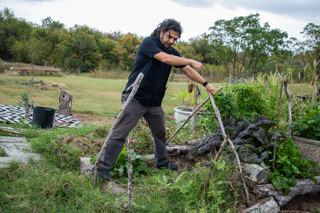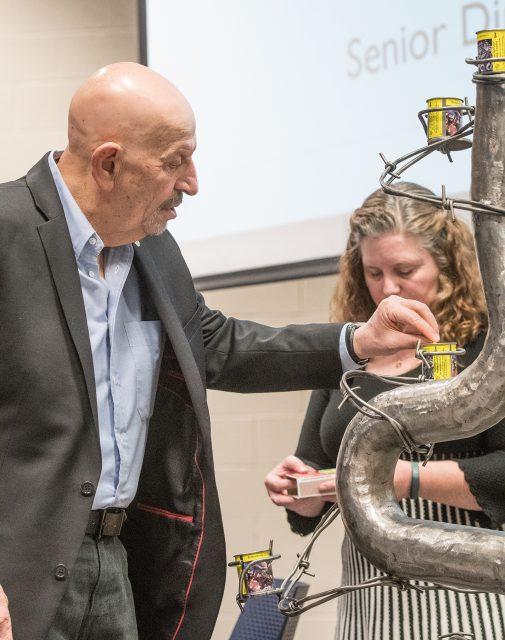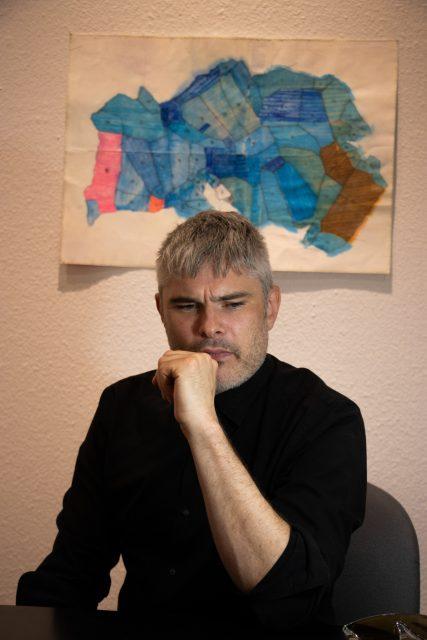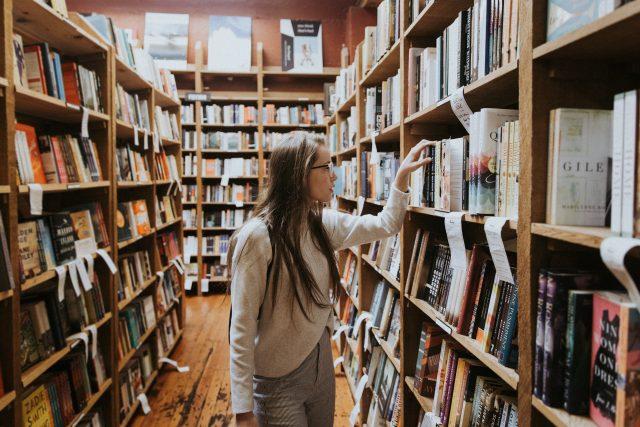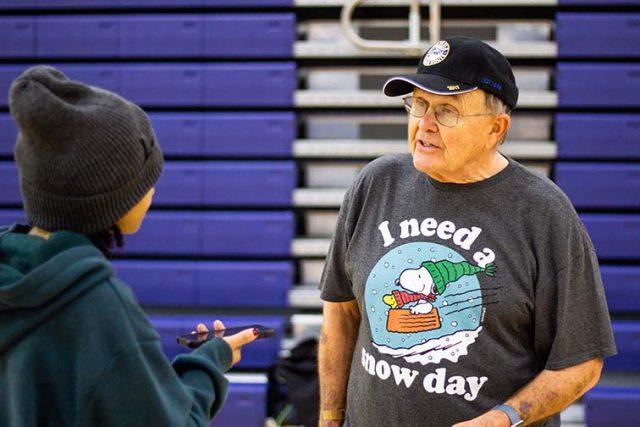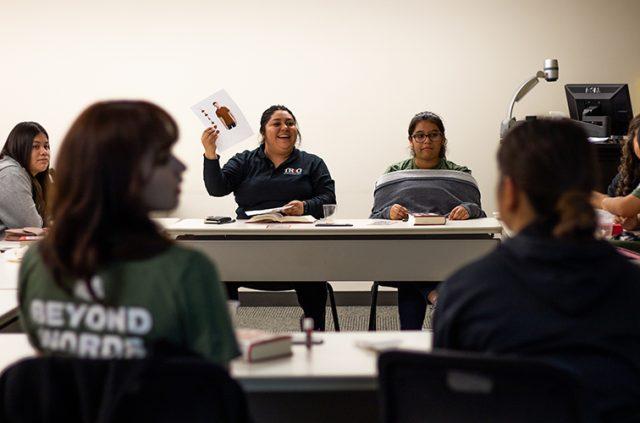By Kathryn Kelman/editor-in-chief
His earliest memory is of hiding under a bed as his village was raided. They took his father, grandfather and other members of his family, robbing him of the chance to know them.
On Jan. 25, two days before the 73rd anniversary of the day the Auschwitz concentration camp was liberated, Paul Kessler, one of the few remaining Holocaust survivors, shared his story in the South Campus rotunda with students, faculty, staff and community members.
“Sometimes I’m asked, ‘Why do we still speak so much about the Holocaust and why so much the fascination?’” said Kessler, a Dallas Holocaust Museum volunteer. “We speak, and it’s not so much about our sad stories. My story is just one of many, not so important in itself. What is important are the lessons we try to teach from the Holocaust.”
The Holocaust survivors have a motto, he said.
“We do all this to prevent such a thing from happening again,” he said.
Despite their efforts, he noted that genocide has continued to happen all over the world.
“The world has yet to learn the lessons of the Holocaust,” Kessler said.
In observance of International Holocaust Remembrance Day, South hosted Kessler and Sara Abosch-Jacobson from the Dallas Holocaust Museum, who provided historical context for the audience. Two other Jewish community members helped conduct a candle-lighting service and participated in a question-and-answer session at the end of the event.
South student Kristen Clay is the grandchild of a Holocaust survivor and lit the sixth candle in honor of the 6 million Jews murdered by the Nazis during World War II. Clay said she never knew her grandfather because he died when her mother was young.
“For me, it was really being able to connect with my grandfather,” she said.
The candle lighting was a way to say those who lost their lives during the Holocaust didn’t suffer in vain, she said.
“My generation and generations to come are going to carry on these stories and they’re going to work and struggle to improve things,” she said.
Clay, like Kessler, said she feels it’s her duty to carry on the stories and the legacy of her grandfather, the Holocaust survivor.
“Part of it is ‘What can I do as someone who has a personal relationship to this?’ but also ‘What can I do to encourage other people to feel as strongly about it as I do?’” she said.
Kessler was born in 1939, the year World War II started, in a small village in what is now Slovakia. His village had no running water or electricity. Jewish people were about 30 percent of the population, he said.
“In 1942, our very own neighbors, our Slovak neighbors, shipped off almost their entire Jewish population,” Kessler said.
He was around 3 years old in his first memory of hiding under the bed as his village was stripped of Jewish people. In addition to his father and grandfather, other members of his family were among those taken from home that day.
Kessler didn’t learn what happened to his father until he was 58 years old and visiting Auschwitz for the first time.
“In Auschwitz, now they have a room where they have the archives,” he said.
Kessler gave a woman in the room his father’s name. She returned with a page copied out of the books with his father’s name, home address, wife’s name, prisoner ID number, transport number, the day his father arrived in Auschwitz and the day he died.
“No reason given,” Kessler said. “I was 58 years old, and I stood there with that piece of paper, and for the first time in my life I felt the presence of my father.”
Kessler recalled looking around at all the books and wondering why the Nazis recorded things when they were committing such atrocities.
“The only thing I can figure out is that Hitler and the Nazis and the Germans believed they were doing something great for the world,” he said.
At age 5, German soldiers came to their village in 1944, so his mother packed up him and what was left of their family and moved to another village. On the morning of Sept. 9, 1944, in the new village, Kessler and his family woke to shouts of “Run! The Germans are here!” he said.
In the chaos, he and his mother escaped to the forest nearby but were separated from his aunt, uncle and grandmother. They hid in the forest for at least a week until they saw someone from the family they had been staying with. The family dug a hole behind their house and covered it with leaves and manure from their animals.
Kessler and his mother stayed in that hole for the next seven months.
“The people hiding us, when they could once a day, would bring us some cold soup, sometimes a piece of bread,” he said. “I know my mother went without several days because I was crying from the cold and the hunger.”
The heroes of Kessler’s story were those “simple peasant farmers” who risked their own lives to save him and his family because unbeknownst to him and his mother, the entire time they hid in the hole behind their rescuers’ house, German soldiers lived inside.
“I often ask myself if I could do the same — risk my life to save that of another human being that I hardly know,” he said. “I don’t know if I could be that brave or that courageous. I probably wouldn’t know until I was faced with having to make that kind of decision that I hope you or I will never have to face.”
Kessler and his mother were freed by Russian forces on April 1, 1945. The family across the street had hidden his aunt and uncle, but there was no sign of his grandmother.
“After we regained a bit strength, we made a trip back to our home,” he said. “Our house was still there. We moved back in.”
A couple weeks later, his grandmother returned. She had been captured and sent to a concentration camp the day the German soldiers raided the village.
Before the Holocaust, Kessler had a family of 20. By the time the camps were liberated and Allied forces won the war, only seven of them remained.
“I was the only Jewish child to survive from that village,” Kessler said, adding that of the 6 million Jews killed, over a million and a half were children.
He was bedridden from malnutrition for a year after the war, he said, but then he got well, went back to school and life started over.
Kessler said it’s still hard for him to believe something like that happened.
“How could these people murder children in front of their parents, parents in front of their children and then attend a symphony that night?” he asked.
After telling his story, Kessler began to talk about the many lessons to be learned from the Holocaust, the first being don’t take anything for granted.
“Freedom has to be fought for and has to be maintained,” he said.
Other lessons included don’t believe everything one hears and be aware of those running for office and the potential consequences of electing them.
“Hitler was democratically elected,” Kessler reminded the audience. “Think about what you do.”
However, the biggest lesson to learn from the Holocaust for Kessler is that the world is dangerous because of those that do nothing. They are guilty of silence and indifference, he said.
“There is no better example than the Holocaust of why indifference is almost a crime,” he said. “Bigotry and hatred are not the most urgent problem.”
The problem is silence, Kessler said.
“Here we are 50 years later talking about the same thing,” he said. “The Holocaust asks, ‘Are you going to be tolerant of those that are intolerant? What will I have done and, more importantly, what will I do?’”
South student Josue Massanet said the part of Kessler’s speech that struck him the most was when Kessler told students to be “up-standers” rather than “by-standers.”
“I hold that message very close to my heart,” he said.
Kessler hoped audience members would take that message away from his speech, he said.
“It doesn’t mean you start fighting with somebody in the hall or what have you,” he said. “But when you see something wrong, act on it. Get a teacher or tell someone nicely, ‘You shouldn’t be doing that. You shouldn’t be saying that. It’s hurtful.’”
















